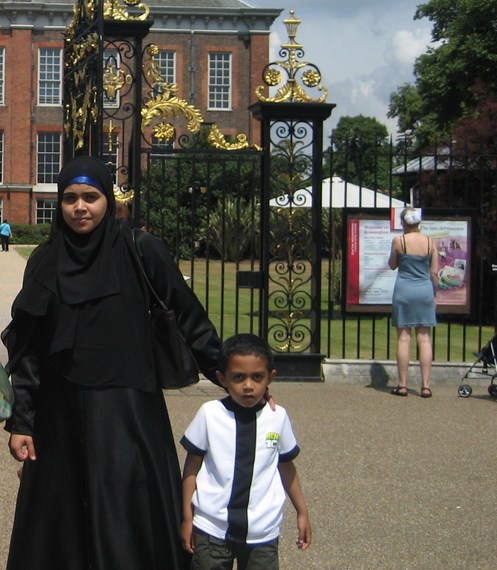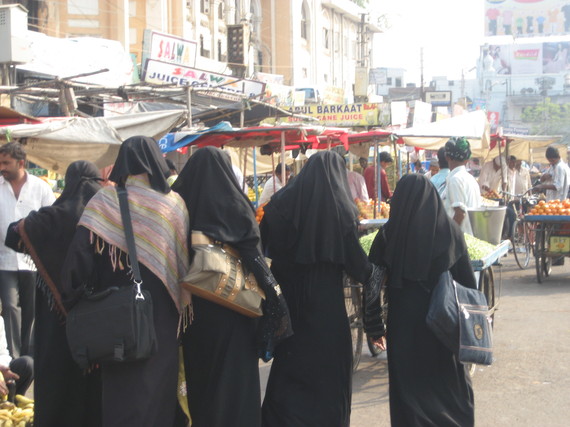The issue of the abaya can be argued back and forth without a universal conclusion. Wearing it as part of a homogeneous group among similarly-clad women in the Muslim world and in parts of India is okay, but wearing it in Western countries where your abaya screams, "I AM MUSLIM", is another matter.
For some, it's a personal choice, for others, it is an offshoot of cultural considerations.
Fathima, a Sri Lankan student at Knowledge Village, Dubai, has been wearing the abaya since she joined college. Having attended an Islamic lecture where the speaker stressed the importance of covering up, Fathima decided to adopt the abaya. It was easier for her than most others, as she had been wearing a headscarf since age 11, and the transition to an all-covering outfit wasn't difficult. It was, perhaps, an easy, rational choice for her: No cost attached, especially not to her freedom, but only the benefit of increased prospects of entering "Jannah."
"I believe every Muslim woman should observe the hijab and cover up from head to toe, as we have been commanded to do so by our Lord in the Quran. I am merely following my Lord's commandments" says she.
On the other hand, Sabah Hadi, who has been wearing the abaya since her school days, says that she wore it only because of her cultural upbringing, but later, she could understand its meaning and relevance as a Muslim woman and actually became proud of wearing it. A global Muslim footprint in Jeddah, Hyderabad and Dammam made the abaya that much more normal to her. Sabah, a freelance writer based in London, says she hopes to continue wearing it all her life, though she fears it may get increasingly difficult as time passes: "It is definitely not part of the London scene, but it is widely accepted as a part of life for a section of the society. I can safely say there is no bias about it," she says.
"I do not think that because I wear the abaya that covers my body, my mind is also covered. However, a lot of so-called educated people do think that way," adds Sabah.
For Azra Usmani, a resident of Sharjah, the trendy abayas worn in the Gulf might someday influence her to start wearing one herself, though she knows that back in her native India she may not wear it. She firmly believes in the old adage, "When in Rome..."
"The whole point of wearing an abaya is so that you don't attract attention to yourself. Heavily embellished sheylas (headscarves) and abayas worn in the Gulf send out the wrong signal," says Azra.
On the other hand, Afshan Zaheer says she has seen abaya-clad women being treated with more respect and dignity. Afshan, who also lives in the UAE, wears the abaya with a niqab, but tucks it into the furthermost corner of her suitcase while holidaying in her home city, Bangalore. "Wearing it in a non-Muslim neighborhood would make me feel odd," she says. So is this then another case of, "When in Rome..."?
Sana Zara Paloba is glad she wore the abaya when she joined a driving institute in Dubai. "I felt safe from prying eyes of inquisitive males," said she, "especially as my training center was also one for truck drivers."
Canadian-born Uzma Kazmi, Huntington National Bank, Ohio, says that as long as one's style of dressing is modest, it serves the same purpose as an abaya. "I do not wear a hijab too because I do not want to stick out or be labeled.' If I wore one, I would definitely feel the odd one out."
"I feel that there is an immediate hesitation to approach women donning the abaya with professional limitations for them as well," adds Uzma, a fact which Shakera doesn't subscribe to at all.
"You should have confidence in yourself and not blame others if you are not strong enough to stick to your beliefs," says Shakera Hadi, Principal, Guidance Educational Academy, Chicago. She recounts the incident when she was the supervisor at a popular department store in Chicago. The store manager, who did not object to her abaya, on discovering that she wore the niqab on duty as well, commented that it would intimidate customers who were used to interacting with the staff face-to-face. Realizing that this could cause the store some problems and not wishing to be the cause of it, Shakera gracefully left the place which, in any case, was a stop-gap arrangement for her till she found the kind of work she was qualified to do.
Another one who propagates covering up is Saher. After careful deliberation, Saher Usmani of London made the hijab a part of her dress. "It gives me a Muslim identity," she says proudly. "I am more aware of my actions now as every action of mine represents Muslim women at large," she adds.
While there are many women who have donned the abaya or hijab as part of their dress, there are others who have discontinued it after having worn it for a while.
After having worn an abaya from sixth grade onwards at her school in Dammam, Saudi Arabia, when Nabeela Razzack shifted to Aligarh Muslim University, she switched to a chador, as she felt very conspicuous in an abaya. When she shifted to Delhi, she stopped wearing the chador altogether. "The change just happened that way," she remarked. "But I never resented the abaya, nor do so now, and always wondered why other girls felt it hampered their image and made such a big issue about it."
Why can't people, as Sabah says, focus on mind and personality instead of what one is wearing or what one looks like? Is the abaya an effective shield from teasing stares, as Sana discovered? Is Uzma justified when she insists the hijab is grossly misrepresented or does Saher's recognition as a Muslim at once turn her into a religious fundamentalist or a subject of patriarchal oppression, a sentiment echoed by many? There are some though who in certain delicate (read: volatile) situations would prefer to hide their Muslim identity rather than flaunt it. More often than not, the abaya is subject to cultural considerations.
Perhaps, like everything else, there is no single meaning of the abaya for Muslim women across the globe. Perhaps it is the rigid view of Muslim women as lacking intelligence to decide for themselves which needs to be debated. Perhaps.
A longer version of this article appeared in The International Indian ( Vol 17.2, April 2010), a Dubai-based publication.


